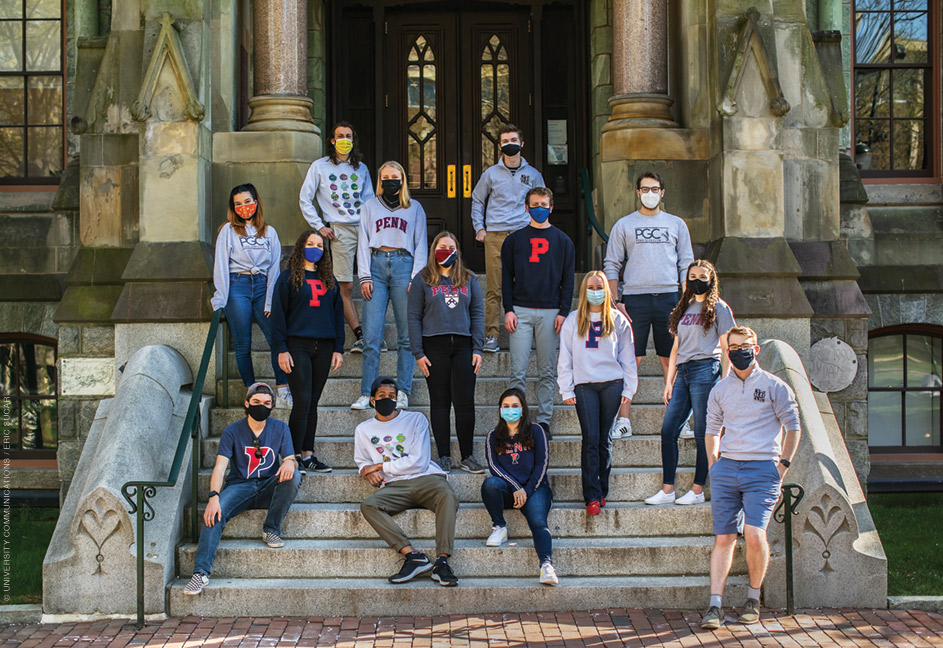
A 159-year-old club strikes a new chord.
When the Penn Glee Club prepared its final song of the 2020–21 academic year, the fact that members were recording themselves from scattered locations wasn’t the only deviation from tradition.
After 159 years, the Glee Club debuted a new sound for a video performance of its signature song, “Afterglow,” at Penn’s Baccalaureate ceremony on May 16. The traditional tenor and bass vocals were still there, but for the first time ever, they were joined by soprano and alto voices. That’s because in April, the group officially dropped the “all-male” from its descriptor and merged with the Penn Sirens women’s choir to create a larger group open to all students and voices.
“We didn’t think it was right to tell people that they couldn’t sing in the group on the basis of their gender,” says the club’s outgoing president Jake Milner W’21. “Now, no matter who you are, if you’re a Penn student, you can audition for the Glee Club.”
“I think it’s great,” says Laurie McCall, director of Penn’s Platt Performing Arts House. “The Glee Club is a group that often gets put in front of the University at high-profile events, so why should it only be one gender up there? That’s not really a reflection of Penn.”
Founded by eight undergraduates in 1862, the Penn Glee Club is the University’s oldest performing arts group [“Glee at 150,” Jan|Feb 2012]. It wasn’t until 1992 that it welcomed its first female member, piano accompanist Sharon Hudson EAS’95. Another woman joined the following year as part of the tech crew, and in 2009 the Glee Club band also began including women. But as they toured the world, delivered singing valentines around campus, and took the stage at countless University events including Convocation and Commencement, the singing section remained all male.
Suggestions to change that had been floating around for several years by the time Susanna Jaramillo EAS’19—a member of the club’s tech crew—became its first woman president in 2018. Jaramillo focused her campaign on opening up the club to singers who do not identify as male—not only cisgender women, but also trans, nonbinary, gender neutral, or genderqueer students. (Milner says the previous bylaws mandated that students be “male-identifying” to sing with the group.)
It was unsettling, Jaramillo says, to watch the Glee Club reject female auditionees at the same time that she served as its president.
Meanwhile, membership was dwindling. The group had about 40 singers when Milner joined in 2017. By last year, it had shrunk to about half that size. “That’s evidence that the club is not drawing as much interest as it did before,” he says. In competing for talent with Penn’s many a cappella groups, “I think we were kind of looked at as a dinosaur in a lot of ways.”
Still, when the club approached McCall with their idea of opening to all genders, “I was a little hesitant just on the basis of what would happen to Penn Sirens,” she says. “I told them, ‘Make sure you’re not going to hurt them by doing this.’”
A choral group formed in 2011—a full 149 years after the Glee Club began performing—the Sirens were considered Glee’s sister group: a home for women who might have joined Glee Club had it been an option. McCall worried that by becoming a gender-inclusive group, the club would squash Sirens’ membership numbers.“It’s hard to go up against a group that’s 160 years old,” she says. “It’s not an even playing field.”
Last spring, Glee Club leaders approached their counterparts in Penn Sirens to broach a merger. And they sought input from Glee Club alumni through Zoom calls and a survey.
But with about 1,000 living alumni who fondly remember their all-male singing group—plus a 159-year-old tradition of strictly performing songs arranged for tenor 1, tenor 2, bass 1 and bass 2 (often shortened to TTBB)—some worried about what may be lost.“There’s an aesthetic effect [of TTBB choral singing] that is quite extraordinary,” says Gregory Suss C’75, who founded the Glee Club Graduate Club (GCGC) alumni organization and still sits on its board. “My concern is that the TTBB sound will no longer have a significant place on campus. … For me, [the Glee Club] was never about representing Penn in totality. It was representing the University with particular musical products.”
“This switch musically alters the Glee Club in a very tangible way,” adds Robert Biron C’91 GGS’92 G’97, who spent 12 years as president of the GCGC. “We were trying to learn: Why do you want to change the Glee Club musically? I don’t know that the students ever really answered that question. It seemed they were focused on goals beyond the music that in fact were changing the musical underpinnings of the Glee Club itself.”
As for the overall alumni response to the change, “I think it runs the gamut,” Suss says. “Some people—especially the younger alums—think it was long overdue. Others feel it’s [the current students’] club, they should be able to do what they want. Others feel it’s a big mistake and don’t want to be a part of it. It goes up and down and all around, as can be expected when you’re evolving a 160-year-old tradition.”
This fall, 14 Sirens will join the Glee Club, along with new members from auditions. Moving forward, the group will perform as a combined soprano, alto, tenor, bass (SATB) choir of about 35 to 40 students, and also break into several smaller chamber groups. A TTBB subgroup will keep the Glee Club’s musical roots alive, as will a soprano and alto group for the Sirens. The club will also keep its barbershop quartet-style group, the Penn Pipers, and the Sirens will become a second small a cappella ensemble within the larger choir.
“My view is that we’re not taking anything away from the group, but a whole new category of music is being added,” says Marina Dauer C’22, the outgoing president of the Penn Sirens. “The goal of this isn’t to destroy the group. It’s to make it representative, add new sounds, and make sure everyone has the same opportunities.”
Jaramillo says it’s “thrilling to know that the club will never reject someone on the basis of gender ever again.”
“While there were obviously alumni who were opposed to it,” she adds, “there were also a lot of alumni who came out to say, This is really exciting. I’ve been waiting for this. Finally the club represents me.” That includes Kathryn Wilson Nu’20, who played bass in the Glee Club band and auditioned as a singer multiple times—not because she thought she’d get in, but to make a statement.
“As a former Glee Clubber, it’s now a place that I feel much prouder to have come from,” Wilson says. “Another Clubber used to say, You’re in a club that you love that doesn’t always love you back. You give a lot to the Glee Club. It becomes a musical and social hub for you at Penn. I feel so much better to say that we are gender inclusive.”
—Molly Petrilla C’06




